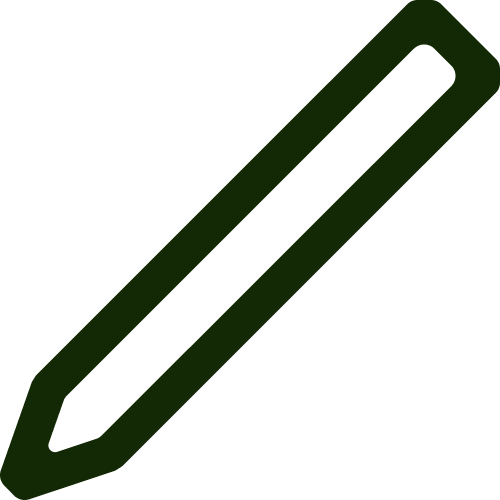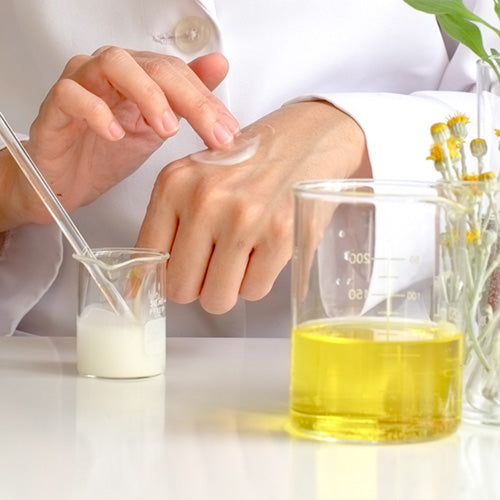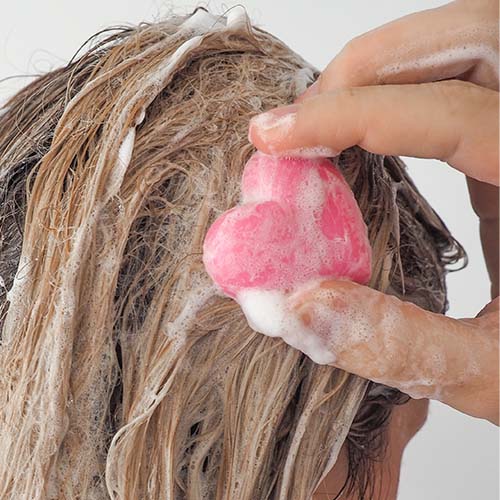We all want beautiful hair. That coveted trifecta of smooth healthy locks with luscious shine and bounce. In our dedicated attempts to achieve ultimate hair perfection, we must admit that we put our hair through a lot.
Multiple chemical processes, drying, straightening, curling, styling, braiding - the list is endless - and it all takes its toll.
When our hair is starting to look a little worse for wear, we hit the internet up to find ways to fix it. But after endless mayonnaise masks and vodka highlight attempts, we admit defeat as we find ourselves up against an onslaught of old wives' tales of haircare myths and legends.
The Ethique team decided to check out these top 6 haircare myths and bust them with good old-fashioned science and facts.
Myth 1: You can repair damaged hair and split ends
Technically speaking, hair is dead. It is not made up of any living tissue and has no regenerative abilities to repair itself. However, there are lots of hair care products and ingredients that are able to disguise the damage cosmetically, giving the appearance of healthy hair.
The key word here being ‘disguise’.
But the effects are temporary as the cosmetic products quite literally come out in the wash. Silicones are a good example of an ingredient that works wonders for smoothing the cuticle and making your hair look healthier but not doing much else to truly repair hair.
Interestingly, there are a couple of patented polymers (like the active ingredient in Olaplex for example) patented polymers on the market work to seal split ends and strengthen hair bonds, but the vast majority of hair care products simply cannot do this.

Myth 2: You can restore damaged curls
We now know that hair is dead so cannot repair itself. But when it comes to ‘damaged’ curls, it really comes down to what type of damage your hair has experienced and what caused it - so this isn’t a straight fact or myth situation.
For starters, curly, coily and wavy hair gets damaged easier than other hair types as the oil from the scalp doesn’t easily travel down the hair shaft.
So, curly hair will always need a bit more help in the moisture department, especially on the mid-lengths and ends. The key is to use products that contain ingredients that smooth the cuticle down to prevent movement of substances in and out of the hair shaft.
If you have curly, coily or wavy hair, you’re likely all over this information and have your curl care routine down already! But if you aren’t, this might help you.
If the ‘damage’ is related to your hair looking frizzy and not so defined, there are loads of hair care products that can help you smooth your hair, but they will have to be applied after every wash. You might also find that co-washing or using a leave-in conditioner can help.
If your hair has lost its natural curl pattern and definition, it may be a result of ongoing chemical damage from coloring, straightening, highlighting services or things like chlorine from swimming pools. Sometimes these activities can so badly damage the bonds in your hair that the curls are permanently distorted. With time and patience you can remedy a lot of this damage, but sometimes a trip to the hairdresser is the only solution. Again, look out for products that contain ingredients that smooth the cuticle down to prevent movement of substances in and out of the hair shaft.

Myth 3 - Protein is essential for curly hair
Yes, protein is an essential component of healthy hair and a key element for beautifully defined curls (your hair is made up primarily of proteins). But adding protein topically to damaged hair doesn’t always have the desired result as protein can’t be absorbed into the center of the hair shaft and bonded into the existing hair, unfortunately it doesn’t work that way.
However, protein can be applied cosmetically on top of the hair. It coats the hair shaft and helps to make it more manageable and easier to style. Healthy curls are the result of a good balance of protein and moisture - so while protein for curly hair is important, it might not always be the only answer.
Chemically and thermally damaged hair typically can’t be fixed by cosmetic applications. However, there is a vegan and cruelty-free brand called Olaplex that uses bond-building technology to restore all types of damaged hair by repairing broken hair bonds while protecting it from further damage.
Myth 4: You should avoid alcohol in hair products as they are bad for your hair
For this one, it is important to understand that not all alcohols are perhaps what you imagine as alcohol.
There are alcohols that are strong enough to strip tar from our roads, but they definitely aren’t the same as what is in the drinks we may like to enjoy on the weekends. The same goes for alcohols in hair care and beauty products - they are vastly different.
Some alcohols can actually help to retain moisture and hydrate hair.
Let's break it down. Here are some alcohols you are likely to come across:
What alcohols do we use?
Fatty alcohols are present in a lot of our products because they are good thickeners and emollients, sealing in hydration rather than dehydrating the skin.
The myth busting answer? Not all alcohols are the same – it’s a big group of chemicals. Some alcohols are very beneficial and are fantastic for moisture retention.
Myth 5: Showering with cold water is great for your hair
The cold-water hair care myth has been around for ages. The alleged benefits of that final cold-water rinse for shiny locks have long been hailed as a glorious life hack that has stood the test of time.
The theory declares that water temperature can smooth and close your hair cuticles and leave you with magnificently shiny hair.
For those of us who prefer not to end our delicious steamy shower for an ice bath sacrifice for our hair, we are in luck!
The cold-water shower for shiny hair is a complete myth. Researchers from TRI Princeton published a study where they measured different water temperatures on hair and discovered that warmer water would be better to enhance shine in hair than cold.
We can maintain our natural shine by using gentle hair care products and turning down the heat on our hair appliances. Using your conditioner bar as a hair mask once or twice a week could also help!

Myth 6: The best way to dry your hair without causing damage is to air dry it! No heat allowed
This one might shock you...
Letting your hair dry naturally is just one of those glorious summer things, we have all done it, we all still do it. I mean, isn’t it true that heat and hairdryers bad for our hair?
According to scientific studies, drying your hair naturally is an absolute no. But it is more about the water than it is about the heat.
Myth busted - our hair swells around 30% when we wet it, and the water breaks down the hydrogen bonds in our hair. Leaving it heavy, saturated and in its weakest state.
The longer we leave our hair at its heaviest weight and in its weakest state, we create the perfect environment for stress and damage.
One study recommends reducing the stress and additional weight on the hair as quickly as possible, by using a low, gentle heat further away from hair (about 15cm) to restore the hydrogen bonds and help our hair back up again.
What are the ultimate haircare myths we should bust next? Send us an email and let us know!

 Impact
Impact Blog
Blog Store Locator
Store Locator


